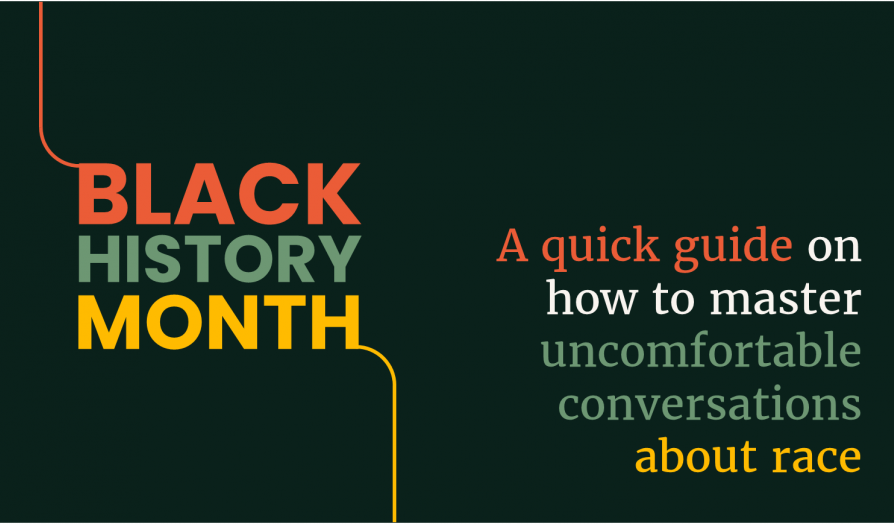Did you know: In the 19th and early 20th century, black and indigenous people were regularly put on show at human zoos for the entertainment of white people? No, I hadn't a clue either. That is, until I looked into it and found it to be true. An entire eon of human existence has been seemingly erased from our school curriculums. As far as I was concerned, World War I kicked off just after Henry VIII beheaded his 2nd wife.
Why is Black History important?
"Political geography is increasingly shaped by politicised historiography", explains Nick Bryant from BBC News in his June 2021 report Once the Future USA is now captive to its past. "The past is viewed through a partisan prism. Rather than agreeing on a collective national story, the trend has been towards separate narratives. Black History Month. Pride Month. International Women's Day. Native-American Heritage Month. History has become hyphenated. But it's also more complete. And it's no longer written solely by the winners. Marginalised voices are telling stories that need to be heard."
A common retort against Black History Month is to ask 'why do they need their own month?' But when you think about it, every day is white history day. There's Halloween, All Saints Day, Thanksgiving, Remembrance Day, Mother's Day, St Andrews Day, Easter, St George's Day, Christmas, Commonwealth Day, Valentine's Day... the list goes on. Despite our common ancestry as a nation and species with our distant black decedents, and aside from perhaps Nelson Mandela Day, I can't think of a single black figure in history commemorated in the same way we celebrate the plethora of often fictional white heroes and abstract white celebrations on almost a weekly basis.
The History of Black Month
Originating in the USA as Negro History Week in 1926, it falls stateside (and in Canada) in February, coinciding with key dates that historically were celebrated by both black and white communities such as:
Frederick Douglass' birthday: Born 14th February 1818, this escaped slave turned anti-slavery national leader was famous for his compelling intellectual abolitionist speeches which laid waste to claims that slaves were incapable of higher thought.
Abraham Lincoln's birthday: Born 12th February 1809 Lincoln served as the 16th US President who enbded the Civil War, preserved the union and abolished slavery.
It took another half-century for a similar appreciation for black contributions to arrive on British shores when, in 1987 - the 150th anniversary of Caribbean emancipation, the centenary of Marcus Garvey and the 25th anniversary of the Organization of African Unity, a concerted effort by Ghanian members of the Greater London Council to commemorate Africa Unity Year led to the formation of the British equivalent which falls (rather perplexingly) in October. An indication of the true regard for equal rights on race on the global stage, the event is yet to gain broader ceremony beyond the borders of these three countries.
Social Construction
Today, so much of what we know about the world is made up. Social Constructs such as flat Earth, Santa Claus, Masculinity, Money and Time (in the way we use it) aren't testable or observable. They only exist because we collectively agree they exist.
A control dynamic first piloted by Julius Caesar, the way to achieve power and wealth without knowledge or influence (hard) is to simply divide people then distort facts to pit them against each other using social construction (easy). This could be achieved by a physical construct (like building a wall) or a cultural construct (like saying 'a woman's place is in the home').
This distortion of facts and world views targets those with out the influence to defend their identity (cue President Trump, JK Rowling and everyone in between), fueling a cycle of inequity, hatred, darkness and ultimately destruction. But every now and then someone needs to remind people of the truth and reunite humans under their ultimate destiny of a common global identity.
There is only one race
Most people believe there is high variation between the DNA of European's and Africans (for example), but low variation within those individual communities. This was disproven by the Human Genome Project (2003), which conclusively demonstrated that skin colour is purely a short term reaction by melanin producing skin cells to protect our bodies from UV radiation exposure. It is not possible for a geneticist to ascertain someone's skin colour based on their DNA. As it turns out, with 99.9% of all DNA shared across humanity and just 1.0% of human beings exhibiting DNA unique to their geography, race is entirely (and quite sadly) a social construct. In reality, our DNA exhibits very high variation within each discrete geography (like sub-saharan africa, or south east Asia) but very low variation between different geographies.
Nothing about our skin determines our intelligence, creativity, drive, potential, talent, morality, beliefs, differences or ethics. This whole competition we have invented around the colour of skin is in fact a competition against ourselves.
Deilightful suggestions this Black History Month...
Unfortunately, during Black History Month, instead of hiring someone like me for £3,000 in order to spread this message of unity, firms will spend millions on performative billboards to attract money from the oppressed, sporting hyperbole like 'ethnicity should not be a barrier to success' alongside the logos of firms that believe inclusion stops at appointing a black person to the board (or not, in most cases).
But if you don't have £3,000 to spare, why not try becoming better with these small changes to your vernacular:
Instead of 'I don't see race', why not try "race doesn't exist. So it's doubly tragic how we've let it become such a blight on our society."
And instead of saying indignantly "I'm not racist" after doing something clearly racist, why not try "first of all, I apologise. Like everyone, I was raised to be racist. But I'm actively trying to do something about it, such as..."
Want to make a real difference on race?
.png)



